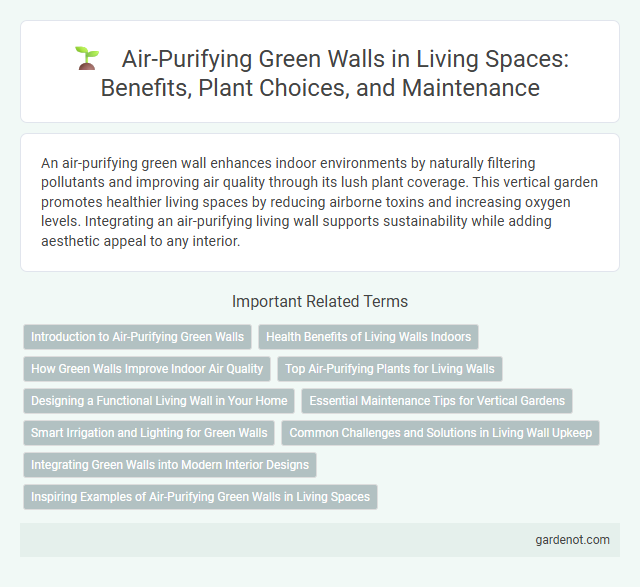An air-purifying green wall enhances indoor environments by naturally filtering pollutants and improving air quality through its lush plant coverage. This vertical garden promotes healthier living spaces by reducing airborne toxins and increasing oxygen levels. Integrating an air-purifying living wall supports sustainability while adding aesthetic appeal to any interior.
Introduction to Air-Purifying Green Walls
Air-purifying green walls are vertical gardens designed to improve indoor air quality by filtering pollutants and releasing oxygen through natural plant processes. These living walls utilize specific plant species known for their ability to absorb airborne toxins, such as formaldehyde, benzene, and carbon monoxide. Incorporating an air-purifying green wall enhances environmental health, reduces airborne contaminants, and contributes to a sustainable, eco-friendly building design.
Health Benefits of Living Walls Indoors
Living walls equipped with air-purifying plants significantly enhance indoor air quality by filtering out pollutants such as formaldehyde, benzene, and volatile organic compounds (VOCs). These natural biofilters increase oxygen levels and humidity, reducing respiratory issues, allergies, and promoting overall well-being. Studies reveal that environments with living green walls contribute to lower stress levels and improved cognitive function, making them a valuable addition to homes and workplaces.
How Green Walls Improve Indoor Air Quality
Air-purifying green walls enhance indoor air quality by filtering airborne toxins and volatile organic compounds (VOCs) through natural plant processes. The foliage and root systems of living walls capture dust particles and absorb carbon dioxide, increasing oxygen levels and promoting a healthier indoor environment. Studies show that green walls can reduce indoor air pollutants by up to 60%, making them an effective biophilic solution for improving air purity in residential and commercial spaces.
Top Air-Purifying Plants for Living Walls
Spider plants, peace lilies, and Boston ferns are among the top air-purifying plants ideal for living walls, effectively removing harmful toxins like formaldehyde and benzene from indoor air. These species thrive in vertical garden setups, enhancing both aesthetic appeal and indoor air quality. Incorporating a variety of such plants in living walls maximizes pollutant absorption and provides continuous oxygen release, contributing to a healthier indoor environment.
Designing a Functional Living Wall in Your Home
Designing a functional air-purifying living wall in your home involves selecting plants known for their high pollution-filtering capabilities, such as spider plants, pothos, and peace lilies. Integrating an efficient irrigation system and proper lighting ensures optimal plant growth and sustained air quality improvement. Incorporate breathable, nutrient-rich substrates and modular panels to facilitate maintenance and maximize the green wall's environmental benefits.
Essential Maintenance Tips for Vertical Gardens
Air-purifying green walls require regular watering schedules and proper drainage systems to prevent root rot and promote healthy plant growth. Monitoring light exposure and humidity levels ensures optimal photosynthesis and filtration of airborne pollutants. Routine inspection for pests and nutrient supplementation supports the vertical garden's longevity and air purification efficiency.
Smart Irrigation and Lighting for Green Walls
Smart irrigation systems for living walls use sensors to monitor soil moisture and weather conditions, ensuring precise water delivery that optimizes plant health and conserves water. Integrated LED lighting tailored to specific plant species enhances photosynthesis and promotes continuous growth, even in low natural light environments. These technologies create efficient, sustainable air-purifying green walls that improve indoor air quality while minimizing resource consumption.
Common Challenges and Solutions in Living Wall Upkeep
Maintaining an air-purifying green wall often faces challenges such as inconsistent watering, pest infestations, and nutrient deficiencies, which can impair plant health and purification efficiency. Implementing automated irrigation systems, regular pest monitoring, and tailored fertilization schedules significantly enhance plant vitality and air quality. Ensuring proper light exposure and using resilient plant species further optimize the living wall's ability to filter pollutants effectively.
Integrating Green Walls into Modern Interior Designs
Air-purifying green walls enhance modern interior designs by improving indoor air quality through natural filtration of pollutants and volatile organic compounds. Incorporating species such as pothos, spider plants, and ferns into living walls not only adds aesthetic appeal but also promotes healthier environments within residential and commercial spaces. Advanced irrigation systems and modular panel designs facilitate seamless integration and maintenance, making green walls a sustainable choice for urban interiors.
Inspiring Examples of Air-Purifying Green Walls in Living Spaces
Air-purifying green walls, such as the renowned Babylon Garden in London and the green facade of CaixaForum Museum in Madrid, demonstrate how vertical gardens effectively improve indoor air quality by filtering pollutants and releasing oxygen. These living walls utilize plants like spider plants, peace lilies, and English ivy, which are scientifically proven to absorb volatile organic compounds (VOCs) and reduce airborne toxins. Integrating air-purifying green walls in living spaces not only enhances aesthetic appeal but also promotes healthier environments by naturally regulating humidity and boosting overall well-being.
Air-purifying green wall Infographic

 gardenot.com
gardenot.com